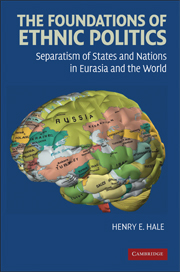Book contents
- Frontmatter
- Contents
- Acknowledgments
- Note on Transliteration
- 1 INTRODUCTION
- Part I Theory with Worldwide Examples
- Part II Case Comparisons: Separatism in Eurasia
- 5 ETHNICITY: IDENTITY AND SEPARATISM IN THE USSR 1917–1991
- 6 CENTRAL STATE POLICIES AND SEPARATISM
- 7 FRAMING: MANIPULATING MASS OPINION IN UKRAINE AND UZBEKISTAN
- 8 INSTITUTIONALLY MEDIATED INTERESTS: THE POLITICAL ECONOMY OF SECESSIONISM
- 9 ETHNICITY AND INTERNATIONAL INTEGRATION: THE CIS 1991–2007
- 10 QUANTITATIVE EVIDENCE: MICRO-, MACRO-, AND MULTILEVEL
- Part III Conclusion
- Index
- Other Books in the Series
- References
9 - ETHNICITY AND INTERNATIONAL INTEGRATION: THE CIS 1991–2007
Published online by Cambridge University Press: 05 September 2012
- Frontmatter
- Contents
- Acknowledgments
- Note on Transliteration
- 1 INTRODUCTION
- Part I Theory with Worldwide Examples
- Part II Case Comparisons: Separatism in Eurasia
- 5 ETHNICITY: IDENTITY AND SEPARATISM IN THE USSR 1917–1991
- 6 CENTRAL STATE POLICIES AND SEPARATISM
- 7 FRAMING: MANIPULATING MASS OPINION IN UKRAINE AND UZBEKISTAN
- 8 INSTITUTIONALLY MEDIATED INTERESTS: THE POLITICAL ECONOMY OF SECESSIONISM
- 9 ETHNICITY AND INTERNATIONAL INTEGRATION: THE CIS 1991–2007
- 10 QUANTITATIVE EVIDENCE: MICRO-, MACRO-, AND MULTILEVEL
- Part III Conclusion
- Index
- Other Books in the Series
- References
Summary
Why have some Soviet successor states been more insistent on preserving their independence, while others have looked more favorably on reintegration proposals? This question touches on a bigger debate in the study of international relations (IR) over how or whether international integration is possible. The theory of separatism developed formally in Chapter 4 suggests that the logic of integrating independent states is not fundamentally different from the logic of integrating regions in an ethnofederal union. In both cases, the core problem is a collective action problem: All units (be they countries or regions) could potentially gain from integration, but once a union is created, the most powerful units within it also face incentives to exploit the others. Just as with regions and separatism, any particular country's attitude to integration with another country is likely to depend on how the collective action problem is understood. These understandings will be influenced in both cases by (1) the degree to which thick ethnic distinctions accentuate perceived risks of exploitation in the collective action problem; (2) the degree to which union institutions provide credible commitments that member countries will not be exploited; (3) the framing strategies that state leaders use when mobilizing any necessary popular support for their initiatives; and (4) those aggregate mass interests on which political support for state leaders is most likely to depend given the particular domestic institutional framework in place to aggregate those interests and to hold politicians accountable to them.
- Type
- Chapter
- Information
- The Foundations of Ethnic PoliticsSeparatism of States and Nations in Eurasia and the World, pp. 190 - 215Publisher: Cambridge University PressPrint publication year: 2008



